The Adventure Games of Jim MacBrayne

I first came across the text adventures of Jim MacBrayne in a November 1989 issue of Adventure Probe fanzine. Geoff "The Grue" Rens was gushing about the first Amiga release by an author whose games, he believed, contained similar elements and magic as those of his beloved Infocom. The game was The Golden Fleece by Jim MacBrayne.
Sadly, not having an Amiga myself, I couldn't experience Jim's games at the time. but the review and the interview did stick in my mind and, almost twenty years later I used the details Geoff mentioned to track down Jim for a brief chat about his games.
A couple of years later, in the midst of the global Covoid-19 pandemic of 2020, I got in touch with Jim again to ask about his memories of an early Supersoft game I was researching. Jim graciously took the time to answer my queries, but he also had some exciting text adventure news to share with the community. More on that later but first, some information on Jim and his games…
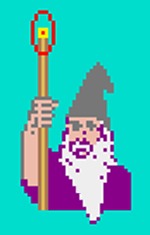 A general practitioner by profession, Glasgow-based Dr Jim MacBrayne bought his first micro, an 8K Commodore PET in May 1979. He played his first adventure game in 1981. It wasn't long before he became a "self-confessed adventure game addict", graduating to a 32K PET partnered with an 8050 disk drive, which gave him access to larger, more sophisticated games.
A general practitioner by profession, Glasgow-based Dr Jim MacBrayne bought his first micro, an 8K Commodore PET in May 1979. He played his first adventure game in 1981. It wasn't long before he became a "self-confessed adventure game addict", graduating to a 32K PET partnered with an 8050 disk drive, which gave him access to larger, more sophisticated games.
In a letter to Micro Adventure magazine in 1984, Jim discussed his experiences playing early PET games like Pirate's Cove, Cornucopia and Catacombs. It was Jim's mention of Catacombs that prompted me to get back in touch with him.
"I'd forgotten entirely about Catacombs until I got your message, but this was indeed the very first true adventure game I ever played, back before I had even heard of Infocom. It was written by someone called Brian Cotton, who was also the author of Cornucopia and Witch Hunt. I played all three games, although I never actually completed Witch Hunt, which was not in the same league as the other two. Apart from the names, I have absolutely no recollection of these games at all, although I would love to be able to play them again out of sheer nostalgia."
He particularly enjoyed another Supersoft game, Weird Wood, saying at the time that the game could possibly have had him stumped if he'd not become friendly with the author, Rob Watts.
"When I bought Weird Wood, it was in a version for 40 column machines. I found this irritating as I had an 80 column screen, and I proceeded to convert it to 80 columns. It was in the process of doing this that I came across Rob Watts' name in a REM statement.
At that time we were both members of the CPUG (Commodore PET Users Group) and I searched the membership list for the name R D Watts. I found it, contacted him, and the rest as they say is history.
He once came to visit me when he was up in Scotland on a camping holiday with his parents. He lives in Alvaston in Derby, and we still send each other Christmas cards. I have little recollection of Weird Wood, although I fondly remember playing it at the time as it was a great game."
Sadly, neither Weird Wood or its potentially unfinished sequel are preserved online.; although we do know of at least one physical disk copy that is still in the hands of its original purchaser.
"It was Rob who persuaded me to try writing my own adventures, and the first of these was Excalibur. This was sold by Supersoft (and also by Grana in Sweden), but it was never much of a source of income. The owner of Grana was a Swede named Peter Tegelberg, and I still have him as a friend on Facebook. He now is based in London as far as I know, but I don't think he now has anything to do with computers."
Jim had used various programming languages over the years, including COMAL and 6502 assembly, but Excalibur was written in BASIC for the Commodore machines, as was Jim's follow-up project.
"My second game was The Black Tower, which was only released as shareware. Both of these games were written for the Commodore PET but unfortunately I do not have the source code for them and have very little recollection of their details. Although true adventure games, they were, however, not particularly sophisticated. I would love to have source code for these two games as I could then rewrite them and bring them more up to date."
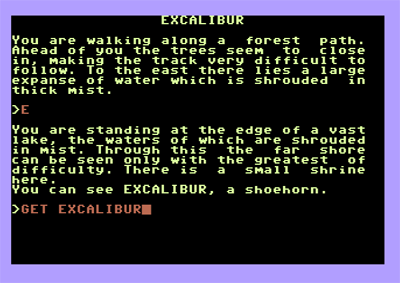 |
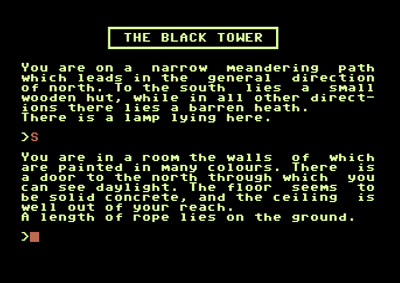 |
| Excalibur and The Black Tower running on a Commodore 64 | |
The Commodore PET versions of Excalibur and The Black Tower aren't archived online, but some C64 versions are, meaning that Jim could potentially use those as the basis for modern remakes.
Jim upgraded to a Commodore 64 in 1983 and then an Amiga 1000 in 1987. When Jim bought his Amiga, the idea of writing an Infocom-style game was always in the back of his mind now that he would no longer be restricted by the lack of memory of his previous machines. When contacted by an adventurer named Jean Thorne, who was requesting help in one of Jim's games, he discovered people were actually playing his earlier titles and that prompted him to give adventure writing another try. This time, he used the more sophisticated language variant Hisoft BASIC to create his adventures.
"I wrote several games for the Amiga starting in 1989, and these were vastly more sophisticated, with powerful parsers. The games were called The Golden Fleece, The Holy Grail, The Mission and Frustration."
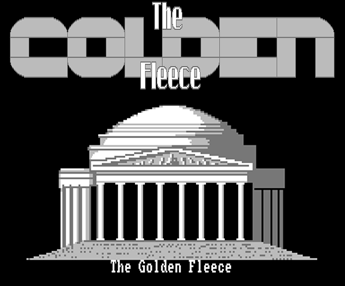 |
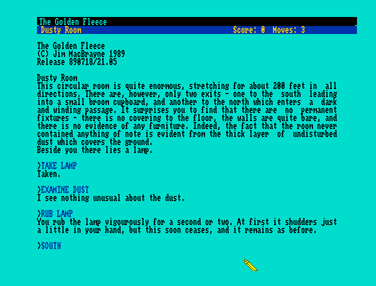 |
| The Golden Fleece... Jim MacBrayne's first game for the Amiga. | |
The MacBrayne games were well received at the time with Syntax magazine saying, "Jim has obviously been strongly influenced by Infocom when writing The Golden Fleece, relying on a good storyline and atmospheric descriptions, not to mention intricate puzzles!"
ACE magazine dubbed Jim's first game, "Traditional fare in grand style… an adventure game of Level 9/Infocom proportions that will delight any seasoned solver."
The Games Machine and Amiga Format both said that The Holy Grail was "good enough to be a commercial product". The Mission was awarded 91% by ZZAP64, earning the coverted "Sizzler" award, and Amiga Computing magazine ran a feature on Jim and his adventures in the public domain section in their August 1990 issue.
 |
| A small selection of the magazine coverage and reviews of Jim's Amiga games. |
Versions for the Atari ST, also using HiSoft BASIC soon followed. Jim also ported all his Amiga games to TADS in around 1995. TADS was a popular text adventure development tool in the mid-1990s. Released by High Energy Software as shareware in 1988, the system was regularly updated, and become the utility of choice for authors wanting to create cross-platform text adventures with more sophisticated features than those provided by earlier packages such as the Adventure Game Toolkit.
"I've always preferred writing my own code to using utilities such as Inform or TADS as it gives you much more control. For example, in The Holy Grail there's a scenario where everything is turned back to front. Thus to EXAMINE [item] you enter the command IGNORE [item], DROP instead of GET, GET instead of DROP, etc. In addition, instead of this scenario being dark and requiring a lamp, it is bright and requires an anti-torch which projects darkness. In the TADS port I managed to get this partly working, but in the PC version it is fully functional in that the anti-torch completely overrides ALL other light sources throughout the entire game. Thus if the torch is turned on you will be in the dark wherever you might be - even if you're outdoors or if your lamp is lit. This isn't actually important for the functioning of the game, but it makes it hang together better and is much more satisfying to me."
Wait a minute… "in the PC version"?
"I think I mentioned to you previously that I still had the original Amiga discs for these in my desk drawer but wasn't sure whether or not they were still readable. It so happens that they were, and only a matter of months ago I managed to get them transferred over to my PC and have them run on an Amiga emulator called winUAE. This is an amazing program, and it is exactly as if you were running an Amiga on your desktop rather than a PC.
Back when I originally moved from the Amiga to the PC, I retained the source code for all these and tried to rewrite all four games for this machine using QBASIC. Unfortunately all but Fleece were too large for this to handle and, much to my later regret, I didn't bother hanging on to them.
When I managed to get my Amiga discs transferred over to the PC just a few months ago, I was able to access the original source code once more. There is now a much more powerful language called QBASIC64, and I set out to rewrite all four games using it. This was really quite an undertaking, but I eventually managed and in the process improved them all. These are fully compatible with all versions of Windows for the PC."
Jim has kindly made all the new ports of his games available as freeware. And I've included links to them at the bottom of this article.
"If you do manage to run these I'd love to hear your thoughts. The parser in all of them is more powerful and sophisticated than in any other game I've come across. It allows you to type in complex sentences, and you can also have multiple commands in the same line of input, each separated by a full stop. If you run any of these games, typing 'HELP' will explain this in more detail.
For example,
TAKE EVERYTHING FROM THE KNAPSACK EXCEPT THE BALL AND THE LAMP THEN WEAR THE LIFEBELT
or
GET LAMP.LIGHT IT.GO NORTH.OPEN THE DOOR.EXAMINE THE TABLE.TAKE EVERYTHING FROM IT EXCEPT THE ROPE
In addition, each input line is fully editable using the right and left arrow, backspace, delete, home and end keys. You can delete an entire input line of any length using the minus key, and you can scroll back and forward through previous inputs using up and down arrows.
There will doubtless be the occasional bug in all the games I uploaded as the PC ports haven't been playtested and it's difficult to look for bugs as the author. You really need someone typing in things that the author would never think of entering. That being said, there shouldn't be anything too important as I've tried to cover most eventualities.
For each game, all the files in the .rar archive for the PC versions are necessary for the games to run - indeed the program checks if they are all present before it will start. The file Story.Start is merely a save file which allows you to restart the game, and Start.sav is purely to prevent the program bombing if it looks for a file with a .sav extension and doesn't find one. Room.Data contains all the encrypted room descriptions and Text.Data has all the ancillary text."
But if the prospect of four modern ports of Jim's Amiga games wasn't exciting enough, Jim has a brand new project to announce…
"Over the past three months, with the lockdown in place, I had the notion to try writing one more game. I have called it Time's Enigma and it is now complete, although no-one has actually played it as yet. Possibly no-one ever will, as text adventures are a bit old fashioned now."
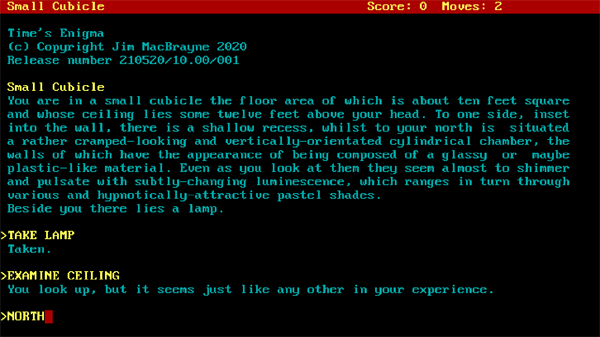 |
Time's Engima... a new 2020 game for PC by Jim MacBrayne After an argument with your old college professor about the immutable nature of time, you find yourself bundled into his experimental time manipulator, seemingly with a mission to bring back objects from the past. |
"Writing Time's Enigma has brought home to me how fast modern machines are. I wrote utilities which allow me to write both the text and the attributes for all the rooms as well as ancillary text used through the game. Once the game writing is complete I then encrypt all these data and write the encrypted files to disc. There are 153 rooms, and each room can have up to eight lines of text. Each letter of that text is encrypted one by one, and in spite of that the entire encryption process for all 153 rooms takes somewhere around a tenth of a second. Similarly, when the game is being played, room text is decrypted and displayed on screen almost instantaneously. This compares with the C64 where lines of text appear almost one letter at a time."
So, not only do we have modern PC ports of Jim's old adventures, we also have brand new game to enjoy in 2020!
You can download the ports and the new adventure using the links to Jim's site below. Type in AUTHOR in the games to find out where to send any comments and feedback you may have.
(Updated links to point to Jim's itch.io page where you can download his games including all those that he went on to write after this interview was initially published)
| Time's Enigma (2020) for Windows PC |
|||
| The Golden Fleece for Windows PC |
The Holy Grail for Windows PC |
The Mission for Windows PC |
Frustration for Windows PC |
| Here are links to earlier versions of Jim's games... | |||
| Excalibur for Commodore 64 |
The Black Tower for Commodore 64 |
||
| The Golden Fleece for Amiga |
The Holy Grail for Amiga |
The Mission for Amiga |
Frustration for Amiga |
| for TADS | for TADS | for TADS | for TADS |
My thanks go to Jim for taking the time to trade emails
|